US government bailout of Silicon Valley and banks is $300B gift to rich oligarchs
The Federal Reserve printed $300 billion in a week to save collapsing banks and bail out Silicon Valley. 93% of SVB deposits were uninsured, over the $250,000 FDIC limit, but the government paid them.
The US government printed $300 billion in a week to save collapsing banks and bail out Silicon Valley oligarchs and venture capital firms, paying them all of their uninsured deposits.
Meanwhile, some of the very same Silicon Valley tycoons who benefited from this bailout have tried to cynically rebrand themselves as subversive populists, claiming they are fighting against the big Wall Street banks with which they have closely collaborated.
Three banks collapsed in the United States in the span of one week in March 2023: Silvergate Bank, Silicon Valley Bank, and Signature Bank.
Silicon Valley Bank was the 16th-biggest bank in the country, and the second-largest bank to go under in US history. It had $209 billion in assets, and went down in the biggest bank run ever.
Signature Bank was the third-largest bank to collapse in US history, with $118 billion in assets.
In the week between March 8 and March 15, 2023, the Federal Reserve effectively printed a staggering $300 billion to stabilize the banking system - and bail out Silicon Valley Bank's and Signature Bank's uninsured depositors.
US government pays billions in uninsured bank deposits to Silicon Valley oligarchs and venture capital firms
Bank deposits in the United States are insured up to $250,000 by the US government's Federal Deposit Insurance Corporation (FDIC), which was created during the Great Depression as part of President Franklin Delano Roosevelt's New Deal.
More than 93% of the $161 billion in deposits at Silicon Valley Bank (SVB) were above this FDIC limit, however, meaning any amount above $250,000 in those accounts was not insured by the government.
Similarly, 90% of Signature Bank’s deposits were uninsured, surpassing the FDIC limit.
Despite this, the Fed made the depositors whole.
The Associated Press reported that $143 billion of the $300 billion that the Fed printed went to holding companies for Silicon Valley Bank and Signature Bank, which were being managed by the FDIC. (The AP added, "The Fed did not identify the banks that received the other half of the [$300 billion in] funding or say how many of them did so".)
"The money they borrowed was used to pay their uninsured depositors", the AP noted.
In doing so, the government has essentially conveyed the message that all deposits in banks in the United States are insured, well above the $250,000 FDIC limit. This encourages depositors to put their money in risky banks that offer much higher rates of interest, like SVB and Signature did.
US President Joe Biden and Treasury Secretary Janet Yellen claimed that the government was not bailing out these banks, but their comments were deeply misleading.
The banks' shareholders were not technically bailed out, but their wealthy depositors were.
Silicon Valley Bank and Signature Bank are insolvent, but as collateral for the $143 billion in "loans", the Fed accepted their Treasury bonds at par - meaning significantly more than they are actually worth on the market, using the face value written on the securities when the banks purchased them, before Fed interest rate hikes caused bond prices to crash.
"This is a subsidy, this is why I called it the real bailout", economist Daniela Gabor wrote in exasperation, adding, "in my 15 years of researching central banks collateral I have never heard one single central banker contesting this common wisdom: never, ever par value".
Gabor referred to this as a kind of "regime change", explaining, "The real bailout story is the regime-change in the Fed's treatment of collateral: Par value goes against every risk management commandment of the past 30 years. It turbocharges the monetary power of collateral".

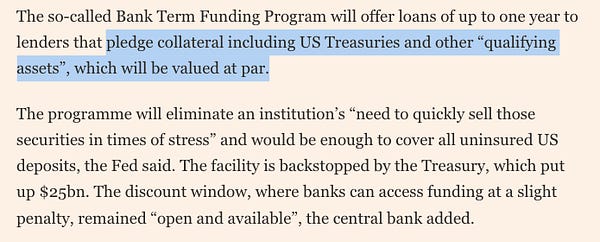
In addition to the bailout of wealthy, uninsured depositors at Silicon Valley Bank and Signature Bank, the Fed gave $153 billion through its "discount window" to stabilize other banks.
The AP reported that this was "a record level for that [discount window] program", noting that, "Typically in a given week, only about $4 billion to $5 billion is borrowed through this program".
SVB: a key link between Silicon Valley and Wall Street, bailed out by the US government
Many media reports have presented Silicon Valley Bank as a financial lifeline for start-up companies, but this portrayal is misleading.
Venture capitalist and private equity firms were SVB's main customers, making up 56% of its loan portfolio at the end of 2022. Only around 20% of the bank's loans went directly to start-ups and tech companies.
SVB's "chief business was making loans through fund subscription lines to venture capital firms", MarketWatch reported.
"The same venture capital investors that the bank had supported for years ended up killing it", the website summarized.
Forbes cited an analyst who explained, "SVB is also not your average regional bank... They are a niche bank catering to the venture capitalist crowd and are not a traditional everyday consumer bank".
Like SVB, Signature Bank worked closely with venture capital and private equity firms. Another important customer base consisted of cryptocurrency companies, which made up around 20% of total deposits.
The financial website Wall Street on Parade explained that Silicon Valley bank "was a financial institution deployed to facilitate the goals of powerful venture capital and private equity operators, by financing tech and pharmaceutical startups until they could raise millions or billions of dollars in a Wall Street Initial Public Offering (IPO)".
Wall Street on Parade analysts Pam Martens and Russ Martens went even further, documenting how SVB was in essence bailed out by the US government throughout 2022, before it crashed.
They wrote (emphasis added):
To put it bluntly, this was a Wall Street IPO machine that enriched the investment banks on Wall Street by keeping the IPO pipeline moving; padded the bank accounts of the venture capital and private equity middlemen; and minted startup millionaires for ideas that often flamed out after the companies went public. These are the functions and risks taken by investment banks. Silicon Valley Bank – with this business model — should never have been allowed to hold a federally-insured banking charter and be backstopped by the U.S. taxpayer, who was on the hook for its incompetent bank management.
We say incompetent based on this fact alone (although there were clearly lots of other problem areas): $150 billion of its $175 billion in deposits were uninsured. The bank was clearly playing a dangerous gambit with its depositors’ money.
Adding further insult to U.S. taxpayers, the Federal Home Loan Bank of San Francisco was quietly bailing out SVB throughout much of last year [2022]. Federal Home Loan Banks are also not supposed to be in the business of bailing out venture capitalists or private equity titans. Their job is to provide loans to banks to promote mortgages to individuals and loans to promote affordable housing and community development.
According to SEC filings by the Federal Home Loan Bank of San Francisco, its loan advances to SVB went from zero at the end of 2021 to a whopping $15 billion on December 31, 2022. The SEC filing provides a graph showing that SVB was its largest borrower at year end, with outstanding advances representing 17 percent of all loans made by the FHLB of San Francisco.
Silicon Valley oligarchs use cynical populist rhetoric to defend the Fed bailout
Despite the fact that SVB was linked with a virtual economic umbilical cord to Wall Street, some Silicon Valley oligarchs like David O. Sacks have cynically tried to portray the US government bailout as a blow to the big banks.
Sacks is a member of the infamous PayPal Mafia, which The Telegraph newspaper described as "the richest group of men in Silicon Valley".
In a soft-ball interview on the Jimmy Dore Show, Sacks claimed the Fed bailout was needed to save a "vibrant regional banking system" from the big four banks that the government has deemed "systemically important" (JPMorgan Chase, Bank of America, Citigroup, and Wells Fargo).
Sacks did not mention that he has made many investments in Silicon Valley companies that stand to benefit from the Fed bailout.

Sacks has been a key investor in Silicon Valley giants like Facebook, Uber, and Airbnb.
His net worth is not publicly known, but he is estimated to have hundreds of millions of dollars in wealth, at the very least.
In 2021, Sacks bought a $23.2 million mansion in Hollywood Hills, Los Angeles. He also has a San Francisco mansion valued at more than $44 million. After selling another $22 million mansion in Silicon Valley, Sacks purchased an additional $17 million mansion on Florida's Miami Beach.
Sacks was an early investor in the CIA-backed data mining company Palantir Technologies.
Palantir was co-founded by Sacks' longtime friend, and fellow PayPal Mafia member, Peter Thiel, a far-right billionaire who was a major funder of Donald Trump's 2016 presidential campaign.
Palantir's clients include Wall Street banks, the CIA, FBI, and National Security Agency (NSA), the notorious US government body that engages in mass surveillance - which is quite ironic, given that Thiel and Sacks often use civil libertarian rhetoric to rail against statist "authoritarianism".
Today, Thiel is a top donor to the Republican Party. Sacks is also a significant campaign contributor to so-called "populist" GOP politicians, like J.D. Vance and Blake Masters - both of whom worked for Thiel.
Thiel, Sacks, and their Silicon Valley oligarch friends have spent decades advocating right-wing culture war propaganda.
In 1998, Sacks co-wrote a book with Thiel, titled "The Diversity Myth: Multiculturalism and Political Intolerance on Campus". The two Stanford graduates recalled their experience at the elite university and the supposed "anti-Western zealotry that masquerades as legitimate scholarly inquiry".
After graduating from Stanford Law School, Thiel began his career at a Wall Street law firm closely linked to the CIA, Sullivan & Cromwell, where the Dulles Brothers got their start.
Similarly, David Sacks kicked off his career working at McKinsey & Company, the notorious consulting firm that is so close to the CIA, the spy agency paid McKinsey more than $10 million to help it with reorganization.
Another major Silicon Valley company that Sacks has invested in is SpaceX, founded by billionaire oligarch Elon Musk, a personal friend of his - and, again, fellow PayPal Mafia member.
PayPal Mafia members have spent years advocating for right-wing Ayn Randian libertarian ideology.
Thiel declared in the libertarian publication CATO Unbound, "I stand against confiscatory taxes, totalitarian collectives, and the ideology of the inevitability of the death of every individual".
Despite this, many PayPal Mafia oligarchs have enjoyed billions of dollars of contracts with US government agencies, as well as billions more in state subsidies.
Musk is the perfect example of this hypocrisy. In a 2015 exposé titled "Elon Musk’s growing empire is fueled by $4.9 billion in government subsidies", the Los Angeles Times noted that SpaceX, as well as Tesla and SolarCity, received billions in state funds.

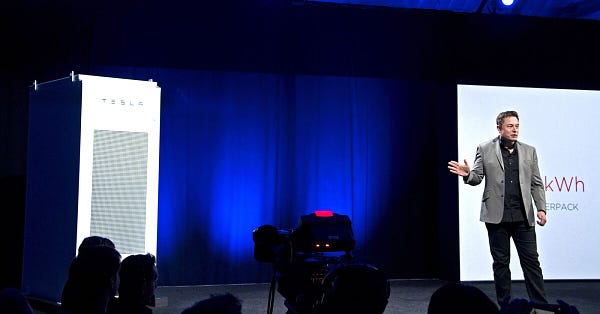
Musk's companies benefited from a "variety of government incentives, including grants, tax breaks, factory construction, discounted loans and environmental credits that Tesla can sell. It also includes tax credits and rebates to buyers of solar panels and electric cars", the Times wrote.
The level of US government support for Musk has only increased since 2015.
Musk has provided his Starlink satellite internet technology to Ukraine, helping NATO wage a proxy war against Russia.
Musk has also put his Starlink tech in Iran, in a blatant violation of the country's sovereignty, as part of a US government-backed regime-change operation.
This came after Musk personally had meetings with the Biden White House.

After a US-backed, far-right coup against a democratically elected socialist government in lithium-rich Bolivia in 2019, Musk declared on Twitter: "We will coup whoever we want! Deal with it".
What all of this shows is that Silicon Valley is inextricably linked to the US government, and specifically the national security state.
While avowedly preaching right-wing political ideology and libertarianism, waxing poetic on the importance of capitalist entrepreneurship and individual responsibility, these Silicon Valley oligarchs are essentially the biggest welfare recipients in US history - alongside the military-industrial complex.
Federal Reserve seeks "to get wages down", while bailing out Silicon Valley
Peter Thiel, whose investment fund helped set off the bank's collapse, said, "I had $50m of my own money stuck in SVB" when it collapsed.
The Federal Reserve printed hundreds of billions of dollars to make sure that oligarch depositors like Thiel didn't lose a penny.
In contrast, the cost of ending homelessness in the United States has been estimated at $8.1 billion per year.
Similarly, the United Nations reported, "To end extreme poverty worldwide in 20 years, economist Jeffrey Sachs calculated that the total cost per year would be about $175 billion. This represents less than one percent of the combined income of the richest countries in the world".
The Fed's bailout was a stark reversal of the quantitative tightening policies that the US central bank had been pursuing for a year, in an attempt to reduce the money supply and fight consumer price index (CPI) inflation.
The Fed's interest rate hikes have caused economic hardship for workers in the US and around the world. But these humble people don't get bailouts.
In fact, Federal Reserve chairman Jerome Powell made it clear that the US central bank's mission is to reduce the purchasing power of workers.
The Fed hopes "to get wages down", Powell admitted in a press conference in May 2022. He complained, "Employers are having difficulties filling job openings, and wages are rising at the fastest pace in many years".
While the Fed blames worker compensation, nevertheless, real wages have been declining in the US, falling by -0.9% in the first half of 2022.


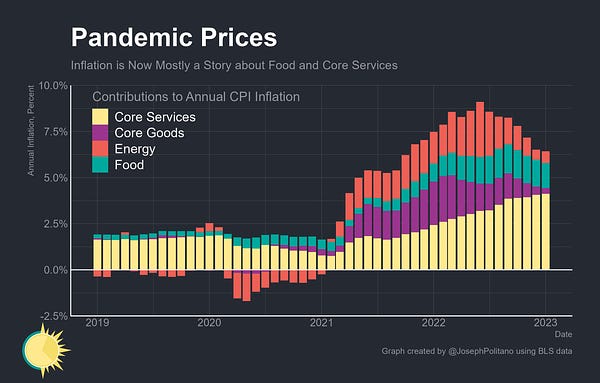
The biggest driver of CPI inflation is not wages; it is in fact skyrocketing rent, followed by the monopoly prices set by food corporations.
Rent in the US increased by 8.6% in 2022 alone. Housing inflation is rising at the fastest rate since the record highs of the 1980s.

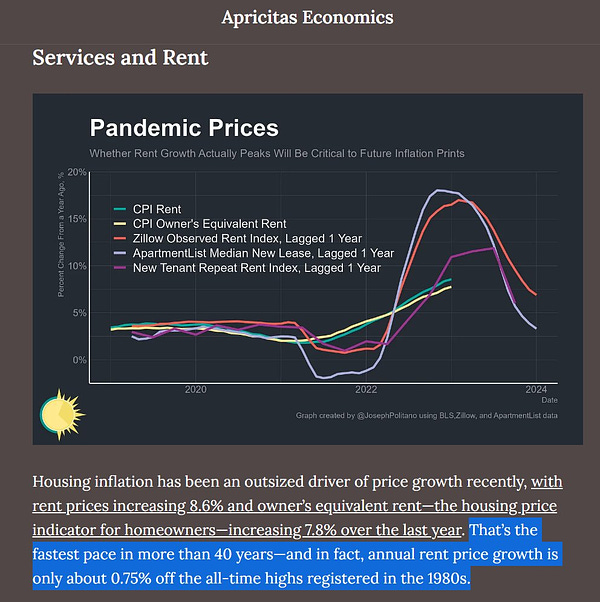
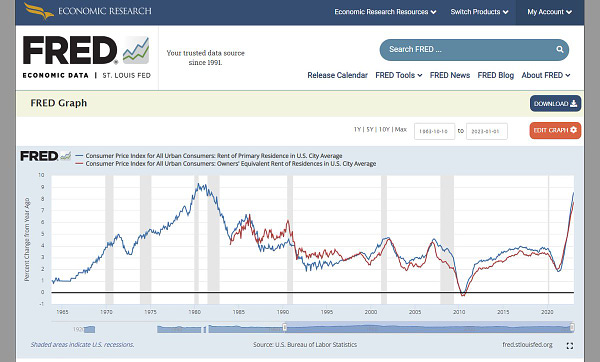
At the same time, the Fed has additionally intervened to make sure that there is not more government regulation of the commercial banks.
The New York Times reported that Powell "blocked efforts to include a phrase mentioning regulatory failures in the joint statement" on the SVB crash that was published jointly by the Fed, Treasury, and FDIC.
"Some administration officials wanted to include that lapses in bank regulation and supervision had contributed to the problems that helped fell the bank", but "Powell pushed to take the line on regulation out of the statement", the Times wrote.
Similarly, NBC News noted that neoliberal "Senate Democrats who voted to loosen regulations on midsize banks in 2018 are standing by their votes in the wake of Silicon Valley Bank’s collapse, joining Republicans in resisting enhanced scrutiny for financial institutions".
It added that these conservative Democrats "voted with Republicans in 2018 to ease regulatory scrutiny of banks with assets of $50 billion to $250 billion after an array of banks, including Silicon Valley Bank, lobbied for the relief".
So not only were Silicon Valley Bank and Signature Bank and their wealthy depositors bailed out by the government, but there will be no increased regulation to prevent this kind of crisis from happening again.
The very politicians in Washington whose electoral campaigns are heavily funded by the financial sector have made sure that the system will continue as before, with two separate sets of rules: one for wealthy capitalists in Silicon Valley and Wall Street, who get bailed out when they're in trouble; and one for everyone else, who always get told to pull themselves up by their bootstraps.





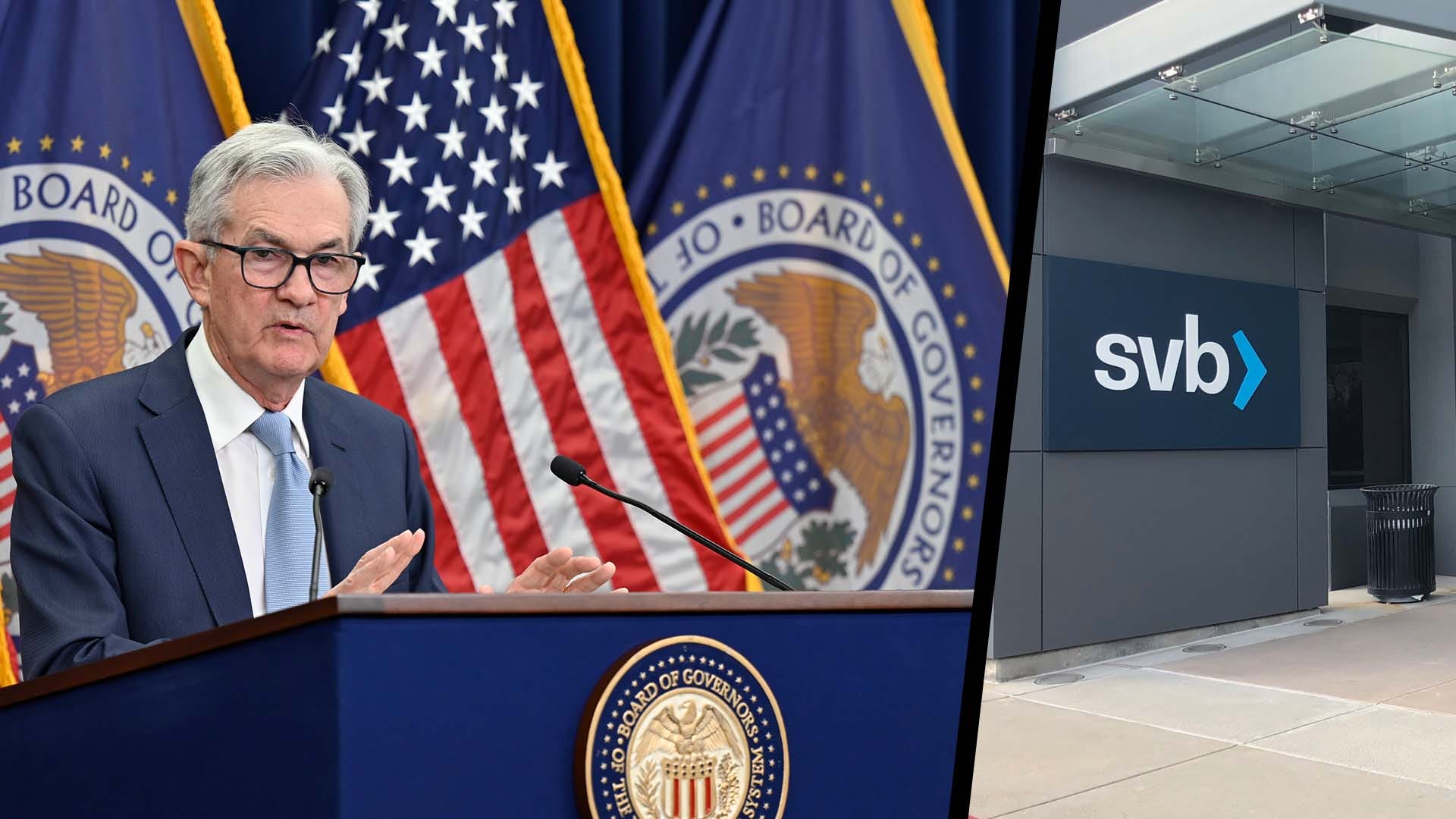
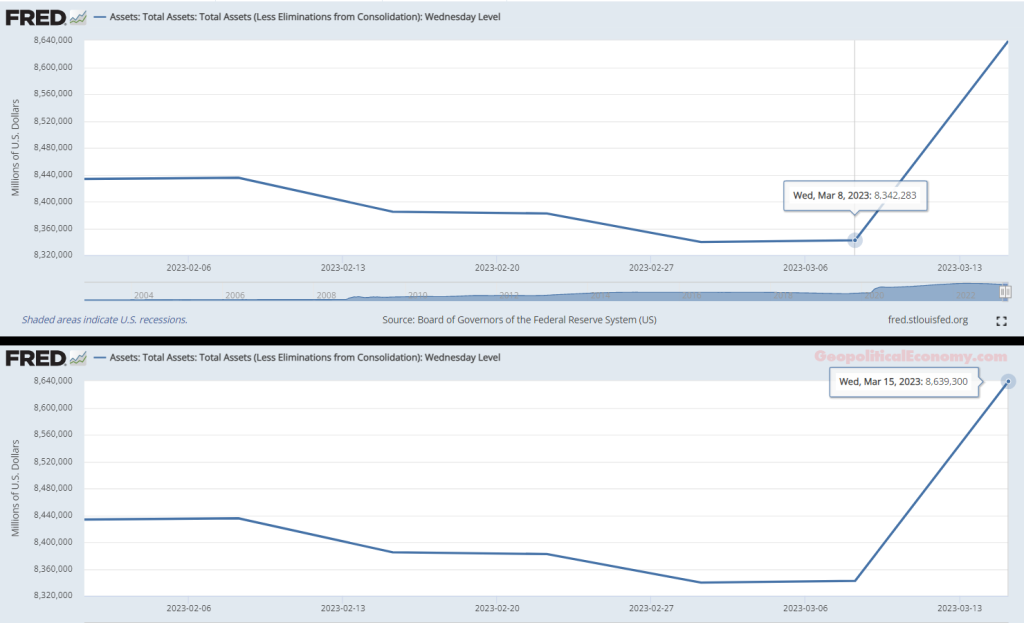
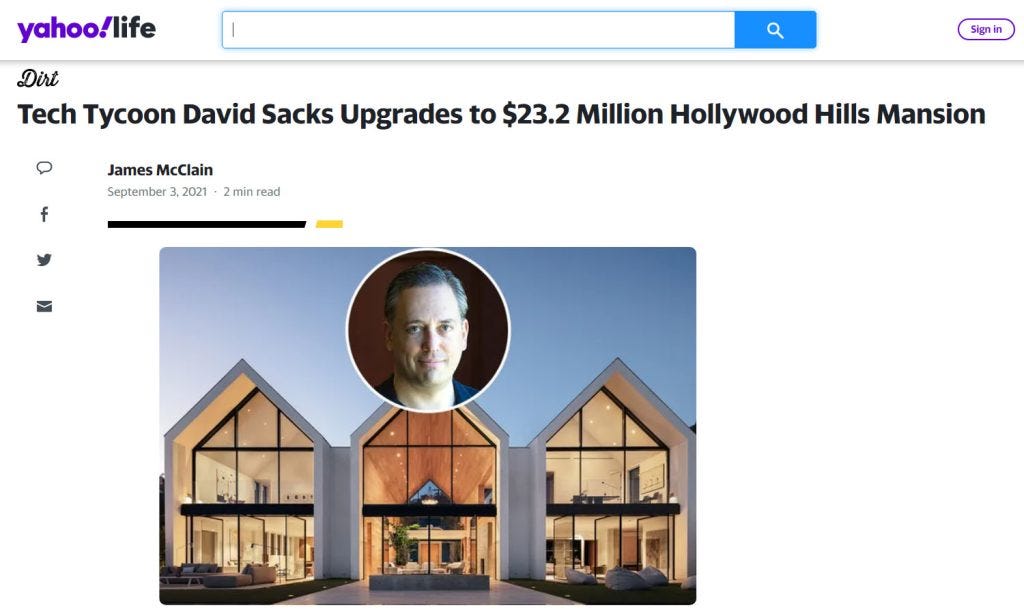
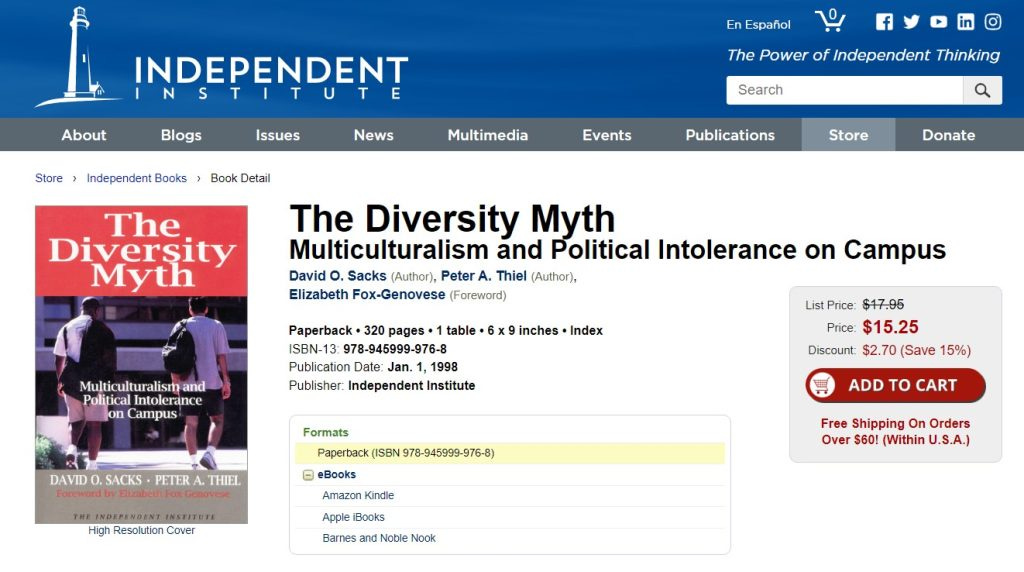
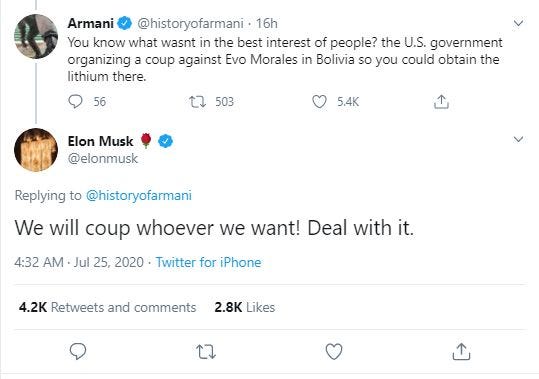
The problem with Capitalism is that these private bankers keep running out of other people's money.
Very, very good again, Ben.
The torching of Maui is directly related to these Thieves' Tyranny. Health Impact News has a good gathering of research--https://healthimpactnews.com/2023/globalists-launch-climate-terrorist-attack-against-citizens-in-maui-destroying-lives-and-property/
Suggestions as how we can dis-invest and CREATE OUR OWN ECONOMY and bases of power are here--https://donpaul.substack.com/p/the-run-on-chase-customers-abandon
I'm subscribing to your Substack next.